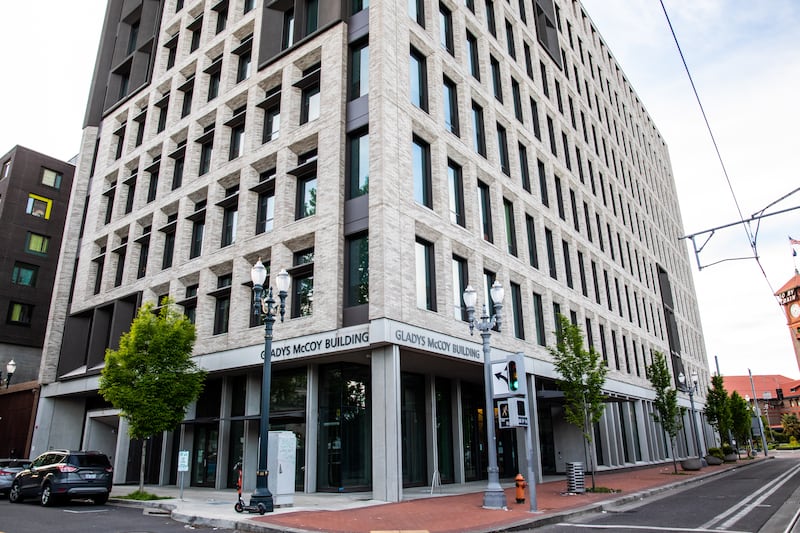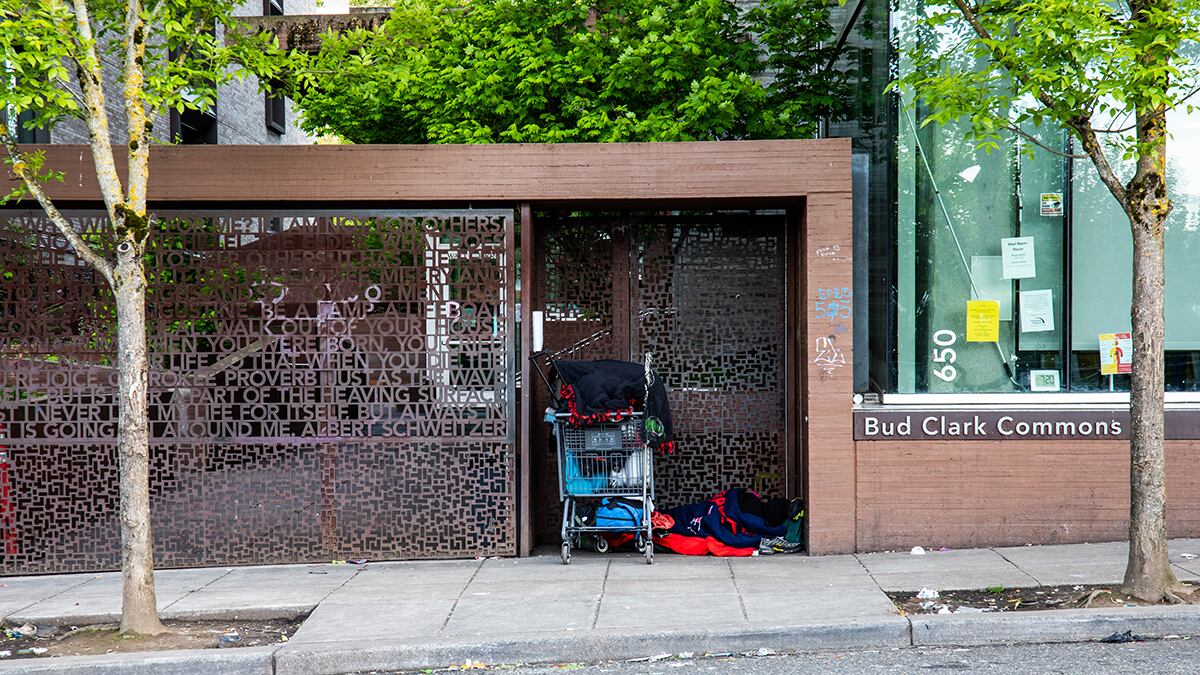Multnomah County officials were so alarmed by threats to the safety of health department employees in downtown Portland that they paid a security consultant $8,500 this spring to assess risks at the Gladys McCoy Health Department Headquarters in Old Town.
That report, delivered to the county by Foresight Security Consulting on March 15, was frank. “The density of unsanctioned homeless camping immediately around the McCoy Building represents the most immediate, consistent, and palpable threat to the safety and security of the employees and contractors in the McCoy Building,” the report concluded.
The McCoy Building is a gleaming, nine-story medical center across from Union Station. At full capacity, it contains more than 400 county health workers who work at a pharmacy and three medical clinics, along with administrative workers and mental health care and addiction treatment staff. (It’s operating at around 25% capacity currently.)
Streets around the building are regularly lined with tents. The building sits at the epicenter of a hurting Portland: The area around Union Station, the report says, is rife with drug addiction, homelessness and mental illness. Unlike the high-rise apartment and office buildings nearby, the McCoy Building is largely there to serve the people living in those tents.
But over the past year, an increasing number of violent and threatening incidents at county health facilities, including McCoy, have left health care workers scared to come to work, according to internal county documents obtained by WW that summarized employee forums on safety held between January and March. A report on those forums says employees, some of them outreach workers in the field, fear their workplaces because of what goes on outside.
“I live alone; no one would know if I didn’t make it back,” one employee told county officials.
One employee recalled debating with his wife whether he should start wearing a bulletproof vest to work. A female employee reported being verbally harassed and having objects thrown at her. Another woman reported being assaulted twice on the same day, including being punched in the face.
Employees have been chased down the street by people with weapons. A man once threatened to kill an employee, accusing him of sleeping with his wife. One manager wrote: “Of my core team, 10 have had orders of protection against others who have been threatening them.”
These workers are not business owners who think tents and trash are cutting into their profits, or homeowners worried about declining property values. They are health workers keenly aware of overlapping systemic failures that land people, many of them county patients, both housed and unhoused, in situations that pose a threat to the workers.
And in documents, many workers say that threat presents them with an ethical quandary: They don’t want to involve law enforcement, fearing that police will make matters worse. But they also fear for their own lives.
“We don’t want to have our clients become justice-involved, especially our BIPOC clients,” one worker wrote. “We’re very close to our clients. At the same time, our clients who are undergoing meth psychosis have expansive aggressive outbursts—we’ve had our walls broken.”
The fears reported at McCoy Building and other county health clinics aren’t exceptional—in the past year, other county public spaces, such as libraries, have seen an increase in employees’ fear for their safety—but they are perhaps the most potent examples of the dangers public employees face.
The county says it’s taking steps to make McCoy a safer space.
McCoy “is one of a number of clinics, libraries and other county services that has experienced changes in the acuity of people nearby who need behavioral health interventions, changes in neighborhood dynamics, and increases in community violence,” says Julie Sullivan-Springhetti, a county spokeswoman. “We are committed to developing and maintaining safer places for our staff and our clients.”
Jessica Vega Pederson, a county commissioner who’s running for chair, tells WW she supports “lobby security, deescalation training, and working with partners on safety around the area could be most helpful.”
Commissioner Sharon Meieran, who’s also running for chair, tells WW she agrees with employees “that the county is not taking their concerns seriously enough.”
Employees feel the county has done little to make them safer.
“There’s always been problems there since the opening of the building, and it’s gotten increasingly worse,” says Rachel O’Rourke, a union representative for the American Federation of State, County and Municipal Employees Local 88, which represents county employees. “Why is it taking so long for the county to realize this is dire?”

The March 15 consultant’s report detailed a number of improvements the county could make. Some were simple, like increasing security guards’ presence around the building.
Others were ambitious, like purchasing the nearby Greyhound terminal, turning it into a four-story parking lot, and then suspending a sky bridge attaching the two buildings. Or sending out patrols on the surrounding streets and bulletproofing the building’s exterior.
Foresight Consulting also sprinkled in a little tension between the county and city: Use Mayor Ted Wheeler’s words to prod the city into action.
The consultant quoted Wheeler saying in March the city would do all it could to transition people off the streets. The consultant wrote the county should “capitalize” on it and “encourage the city of Portland to remove campers from adjacent to the [safe rest village] and Greyhound shelter.”
The city is responsible for conducting sweeps of homeless camps, something the county has no part in. Sweeps are highly contentious, as they create instability for vulnerable people with nowhere to go.
The county tells WW it did not ask the city to sweep the camps. But it did apply opaque film to a portion of the building windows, created a new way of reporting incidents, offered deescalation training and asked the Portland Police Bureau to help curb drug deals around the building. (Police Chief Chuck Lovell, according to the county, told Multnomah County Chair Deborah Kafoury that “there were limits to the bureau’s ability to be proactive.” The county says it’s reviewing the report for further action.
Prior to the report, the county had already taken some steps to improve safety. It offered clinic employees personal safety alarms, offered escorts to and from transportation to the clinic, hired additional security guards, and gave employees parking vouchers for January through March, reasoning that once the days got longer daylight would deter incidents.
The union representing workers in the building, however, says the county has taken few meaningful actions after the report.
Joslyn Baker, Local 88′s president, says the parking passes were a “small concession that was really, really hard to get. And it came after an incident.”
“What’s the tipping point? What is it going to take to activate them?” Baker asks.
Such frustration is not new at the building: Two months ago, WW reported that the building’s HIV clinic was supposed to have a negative air pressure room to protect patrons from the spread of COVID-19, but in fact the clinic had no such room. Despite this, it took the county more than a year to move forward with a plan to install negative pressure rooms.
The county insists it’s taking safety at the McCoy Building seriously.
“After one of the most disruptive social and economic periods in our history, the county is focused on increasing the security of patients and employees across our system,” Sullivan-Springhetti says. “We are committed to developing and maintaining safer places for our staff and our clients.”
But the tenor of employee comments in the county report shared with WW was desperation and frustration: “When the email goes out, and all the way at the bottom it lists options for therapy. That infuriates me,” one person wrote. “Employees don’t need therapy, they need to feel heard.”
Perverse Incentive
Last fall, Multnomah County tried to encourage COVID-19 vaccinations with $50 and $100 gift cards distributed at pop-up locations manned by county employees.
A Sept. 3 email from county health department director Ebony Clarke to employees describes what happened next: At two locations, county employees were threatened by armed men.
“Many of you have also had to manage conflict over the incentives and put up with verbal abuse from members of the community/general public,” wrote Clarke, who assured workers the county was beefing up security.
Some patrons sought additional gift cards after having just been given a vaccine shot. When employees refused, patrons occasionally got verbally and sometimes physically aggressive.
“The desperation was understandable,” says union representative Rachel O’Rourke. “It was basically putting a pile of cash with a bunch of county employees, and there was a level of desperation that I don’t think the county planned on or understood.”
In the wake of the incidents, the union asked the county to halt its incentive program until stricter security protocols were adopted. County Chair Deborah Kafoury said no, according to AFSCME Local 88 then-president Percy Winters in an email to members Sept. 13: “The chair stated she would not end the program at this time.”
The chair defends her approach.
“I was not going to outright stop a program that so obviously would save lives,” Kafoury tells WW. “Instead, I increased security, ensuring our security contractor was at most events, moved teams to safer locations, and shut down any clinic if an incident occurred.”
This article was published with support from the Jackson Foundation, whose mission is: “To promote the welfare of the public of the City of Portland or the State of Oregon, or both.”

